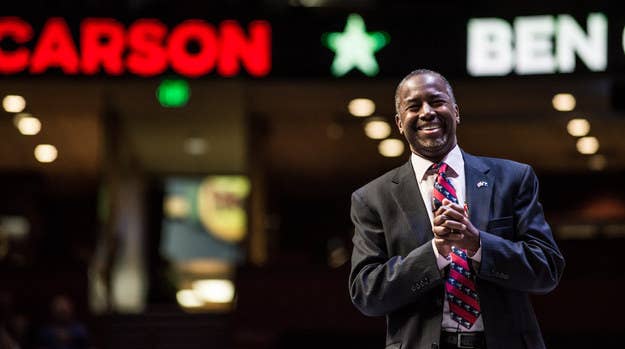
ANDREW KACZYNSKI: If I could just start off with like a couple of questions for you. I wanted to know, just some personal ones like what’s your favorite classical music?
BEN CARSON: Baroque music.
AK: Baroque music.
BC: I love Baroque music.
AK: What do you do to relax?
BC: Play pool.
AK: Pool?
BC: Course, I don’t get to be home very often so I don’t get to play pool very often, so I don’t get to relax very often.
AK: Very true to form in the movie (Gifted Hands).
BC: Yes.
AK: Favorite movie?
BC: Probably True Lies. It’s a very, very funny movie.
AK: Interesting. Favorite author?
BC: Solomon.
AK: Is there a book you’re reading right now?
BC: He was incredibly wise. Actually there’s several books I’m reading right now. One is Saving The Republic by Mitch Daniels. One is Rules for Patriots by Steve Deace.
AK: Iowa host, radio host right?
BC: Yeah.
AK: Do you have a favorite economist?
BC: Probably Tom Rustici (AK note: a professor of economics at George Mason University).
AK: What about foreign policy, or just maybe who would advise you on foreign policy if you were in the White House?
BC: Probably quite a few people. Right now my chief person is Gen. Dees, Robert Dees.
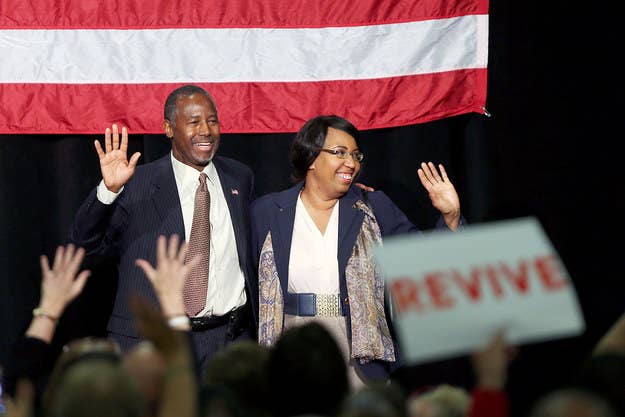
AK: I want to ask you about something I read in a few of your books, which I know you’ve come back from, which is you used to be pretty fond of nationally funded catastrophic health care coverage and I’m wondering if there was a single event that made you move from that to primarily being in favor of health savings accounts.
BC: Yeah, primarily recognizing that if I was going to continue to work within the system which we have, which is very inefficient, that that might be the best way to go. But I’ve subsequently decided that the system itself just doesn’t work and we need something completely different that puts patients and care providers back in charge. Because all you need for good healthcare is a patient and a healthcare provider, along came the middle man to facilitate, and now it has become the primary entity with the health care provider and the patient at its beckon call and it doesn’t even need to be there.
AK: In Take The Risk there’s a section at the end where you’re sort of analyzing and you come up with the Cuban Missile Crisis as one of your examples and I know you say that if we keep up with our inconsistent responses in foreign policy, we could deteriorate international relations to a point that we’re heading toward a world war with atomic annihilation. What do you think of something like the Iran deal. Do you think we’re heading toward that point?
BC: Well, I certainly think that the Iran deal does not prevent the Iranians from becoming a nuclear state. I think it was a very poorly negotiated deal, almost a desperate deal. You know, it doesn’t encompass some of the key elements of the negotiation and I think it will probably accelerate the nuclear arms race in that region of the world.
AK: Do you think we’re heading towards World War III at this point?
BC: I don’t know, but I do recognize that we face increasing danger as more people become radicalized and as those people acquire weapons of mass destruction.
AK: If you were president, what would you do on day one in terms of the Iran deal?
BC: Well, first of all I’d indicate that it no longer is valid because it was done as an executive deal, which means it wasn’t a treaty, which would of carried over on to the next administration. It only carries over if the next president wants it and I would not want it. I would let them know that I’m certainly willing to negotiate, but not on the basis of that deal. I would want our hostages back and I would want anytime, anywhere inspections and if they didn’t agree to that, then they had no intention of complying anyway and we would move forward toward punitive measures.
AK: Would that include military action?
BC: That wouldn’t be the first thing, but I certainly wouldn’t take that off the table.
AK: If our intelligence tells us that Iran was breaking the deal, I know the deal sort of moves the breakout period for Iran to get to the bomb, if you were president and you reneged on the deal and we saw that Iran was moving towards the bomb, would you move towards military action?
BC: What do you mean when you say, ‘I reneged on a deal?’ You mean if they reneged on the deal?
AK: Well, you said on day one that we’d say the deal with Iran was no longer valid and --
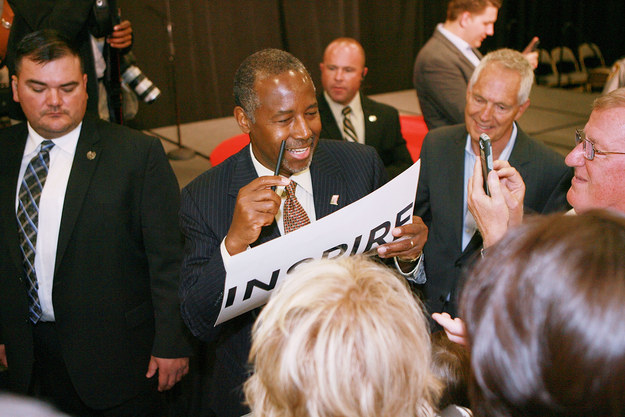
BC: I don’t call that reneging on the deal --
AK: But it’s an international agreement…
BC: It is an executive agreement --
AK: Right.
BC: It carries no weight unless the next president wants it. If it had been done as a treaty, then it would’ve carried great significance and that’s the way it should've been done.
AK: Let me ask it a different way then. If, under those circumstances, Iran was still moving towards the bomb would you say military action would be the best option?
BC: Military action is never the first thing that you jump to. You always look at other possibilities, including economic sanctions, tightening the screws. One of the problems that we have is that we’ve lost the respect of many of our former allies. So when we say, ‘let’s do this’ they say, ‘hmmm, nah I don’t think so.’ And that’s problematic for us and we’re going to have to restore those relationships and I think that there’s some degree of urgency to having people have confidence in us again. As just a case in point, the reason that Ukraine was willing to give up its nuclear arsenal is because there was an agreement that, you know, we would offer protection for them if something happened (AK note: Politifact has rated this false). Something did happen. Did we offer them protection? No. We won’t even give them offensive weapons. The way we’ve given Israel the cold shoulder. These things are not unnoticed by our allies around the world.
AK: I wanted to ask you. You’ve said, I’ve read probably in America the Beautiful and have heard you at least three or four times that you think the conditions in the U.S. at this point are similar to as they were in Nazi Germany and I’m curious if you think something like the Holocaust could happen again in our lifetime.
BC: Well, first of all, I’ve never said that. I think that is complete distortion and a lie that’s perpetrated by people trying to create controversy. What I’ve said is that in Nazi Germany people did not stand up against Hitler. People didn’t stand up against Hitler. They didn’t stand up for what they believe, even though they didn’t believe in what he was doing and that is always a mistake and you have to be willing to speak out and stand up for what you believe in, that’s what I’ve said.
AK: One of the things you said is that we need a wall on the Mexican border. We’ve never caught terrorist on the Mexican border, but we have on the Canadian border…
BC: A wall is not what I advocate, it’s a fence. A double fence with an asphalt road in between to provide quick access. There’s a major difference between the two. And it’s not just a barrier, it’s also — you have to have people there. You know, if you go to our border in Arizona right now, there’s no border guards there.
AK: Right.
BC: That doesn’t help and—
AK: My question’s more, do you think, because we’ve caught people coming in from Canada, that we should have something like that along the northern border as well?
BC: Oh, we should have it along all of our borders. But it doesn’t have to be a fence. We also have all kinds of capabilities: electronic surveillance, motion detectors, people. We have a lot of technology, we need to use that.
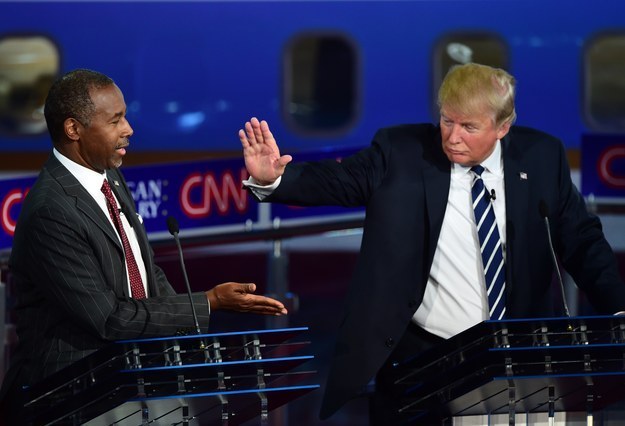
AK: There’s one thing in your book that stuck with me, which was you talked about your mother getting arrested by a police officer once and you had a Yale colleague get the charges thrown out because they were frivolous. I’m wondering how something about that affects your view on both criminal justice reform and the Black Lives Matter movement.
BC: Well, I recognize that there are, you know, inappropriate actions done by policemen, just like there are inappropriate actions done by doctors, nurses, teachers, even journalists. It doesn’t make all of them bad, and it doesn’t create an overall impression of them all. And I think it’s probably not the most reasonable position to take — that because you have a police officer that does something bad that all the police are bad. Having said that, do we always need to always be vigilant and pay attention to the justice system? Absolutely. Do we need to look at, you know, mandatory incarceration of people involved in nonviolent crimes? Of course we do. We don’t want to send them to a university to make them into more hardened criminals. So yeah, all of these things are things that could be improved upon.
AK: I saw your comments on you wouldn’t want a Muslim as president and I’m wondering if that was something you would extend to people like atheists and Scientologists.
BC: Well, first of all, did you see the whole interview?
AK: I did.
BC: Cause you’ll know then what I said is it doesn’t matter what a person’s background is. If they accept American values and if they are willing to subjugate their belief system to our Constitution, then that’s fine. That’s — I don’t care who they are. That’s fine. A Muslim, Scientologist, Jew. It doesn’t matter who they are. If they are willing to do that. The next question then assumes that, you know, Muslims don’t fit into that category and the only reason that they wouldn’t fit into that category is if they believe in all tenets of Islam, including Sharia, which is incompatible with our Constitution.
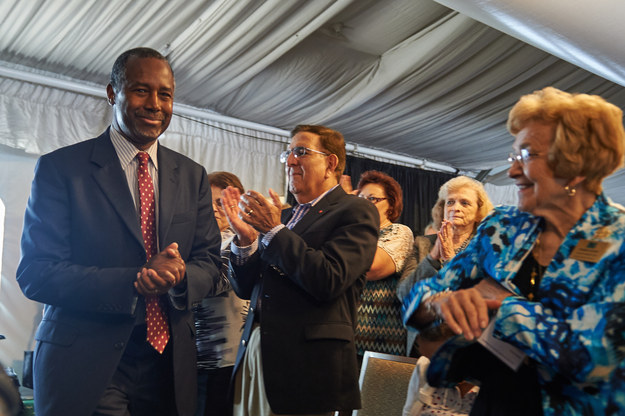
AK: What do you think was the most important even in U.S. history?
BC: Most important event?
AK: Most pivotal. I know from reading America the Beautiful and that you’re a big studier.
BC: I don’t know. There are so many. There are so many incredible things that have happened throughout our history. And this is an amazing country that we live in. And I think, you know, the important thing for people to recognize is that there are a lot of things that happened in our history that are extraordinary and that set us up to be a very unique nation, and a very extraordinary nation and we should take pride in the fact that we’re different and that we are extraordinary and not be trying to give away our identity and our values simply so that we can be politically correct.
AK: I just want to know if you have a favorite and least favorite president.
BC: I have some favorite presidents. George Washington and Ronald Reagan and John F. Kennedy.
AK: Why Kennedy, if you don’t mind me asking?
BC: Because he was very brave. I mean, he faced so many things when he came in as a young 44-year-old president. You had the Cuban Missile Crisis, you know, the Vietnam War, Bay of Pigs, the Russians had gotten ahead of us in the space race, you had the Civil Rights Movement brewing. And, you know, you had an economy that was doing very poorly and what did he do? You know he faced down the Russians with a naval blockade on the brink of World War III. He put his brother, Bobby, in charge of the Civil Rights issues and Bobby was very sensitive, a very, very good guy to do that. He utilized the bully pulpit to galvanize business, industry, academia to say, ‘Look, we’re going to put a man on the moon within this decade and bring him back safely.’ Created a vision and galvanized the actions of so many, gave us a national vision and he faced down his own party. They said, ‘We gotta raise taxes’ and he said, ‘No, we need to lower taxes.’ And it stimulated the economy, I mean he was very brave, that — maybe why he got assassinated, I don’t know. But he was a very brave man.
AK: Least favorite?
BC: I’d rather not, I’d rather not talk about…
AK: Fair enough.

